RV Office Space Tips
Setting up an RV office space may be just what you need to make that dream of Full Time RV living and travelling a reality.
Are you tired of the daily grind and dreaming of a life on the open road? Imagine waking up to stunning natural landscapes every day, working from your mobile office in your RV, and having the freedom to travel wherever your heart desires.
In this blog post, we’ll show you how to make the most out of your mobile office and turn your RV into a productive workspace on wheels.
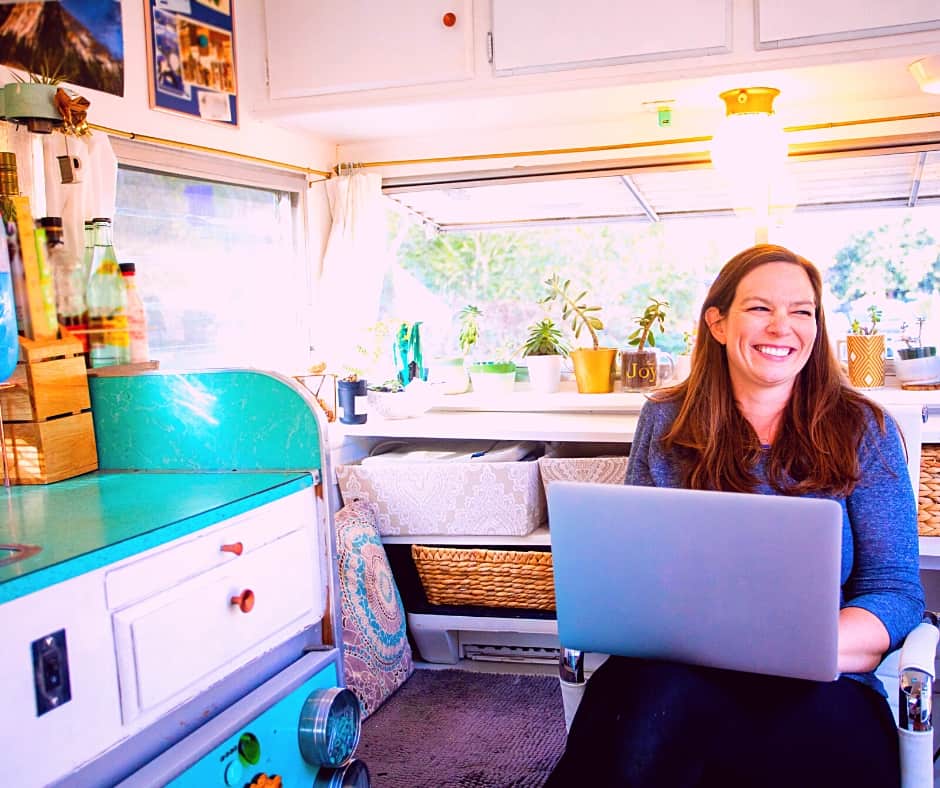
One of the biggest advantages of full-time RVing is the ability to work from anywhere. However, setting up a productive workspace in a limited space like an RV can be a challenge. We’ll explore the benefits and challenges of RV office space set up and provide you with practical tips and recommendations for creating a mobile office that maximizes productivity and comfort while on the road. Whether you’re a digital nomad, remote worker, or simply looking for a way to stay connected while enjoying the freedom of the open road, this post is for you.
The Benefits of Full Time RVing
One of the main reasons people choose full-time RVing is to save money. By downsizing your living space and adopting a minimalist lifestyle, you can significantly reduce your housing and living expenses.
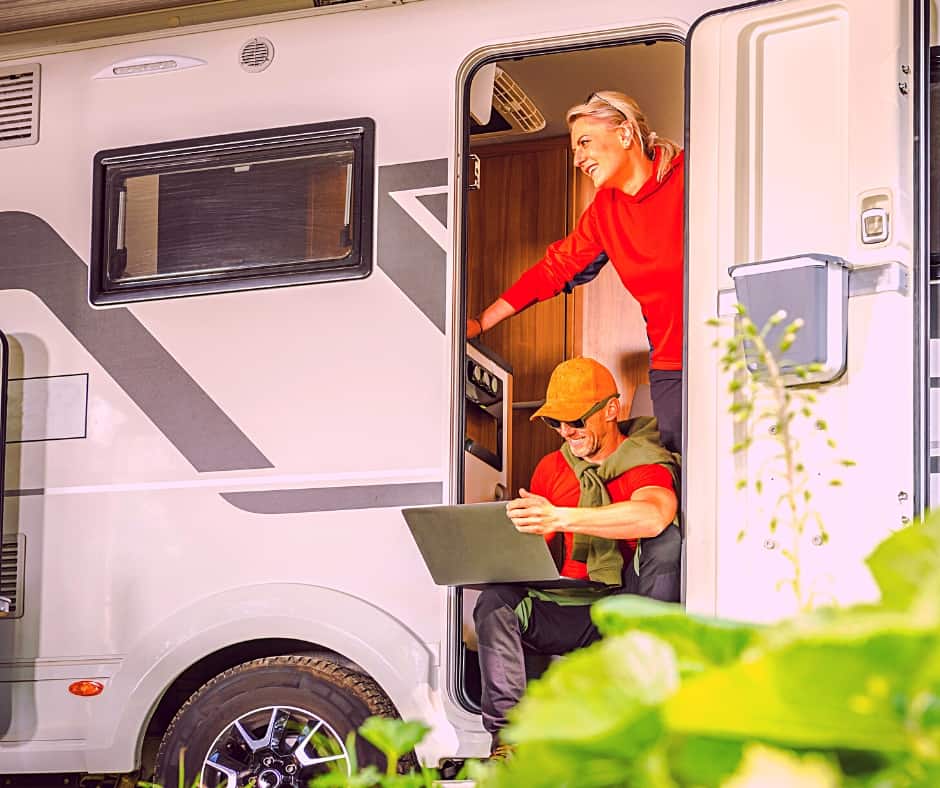
Here are some ways you can save money while setting up an RV Office Space:
Choose the right furniture and equipment:
opt for multi-functional furniture that can serve multiple purposes, such as a desk that can be folded down when not in use, or a bed that can be converted into a sofa. Look for used or refurbished equipment and furniture to save money.
Create a designated workspace:
Having a designated workspace can help you stay focused and productive, but you don’t need to spend a lot of money on fancy office furniture. Instead, use a small desk or table, a comfortable chair, and organize your supplies and equipment in a way that maximizes space.
Maximize storage:
Lack of storage space is a common challenge in RV living, but there are many creative solutions to this problem. Use stackable bins or shelves, utilize wall space for hanging storage, and opt for compact and collapsible kitchen and household items.
Cook your own meals:
Eating out can quickly add up and take a toll on your budget. With an RV kitchen, you can easily prepare your own meals and save money on food expenses.
By adopting a frugal mindset and implementing these tips, you can save money while enjoying the freedom and mobility of a tiny house or RV lifestyle.
Get Out There
One of the most appealing aspects of living in an RV is the increased mobility and ability to travel. With a mobile office, you can work from anywhere and enjoy the freedom of the open road.

Here are some tips for increasing your mobility while setting up an RV Office Space:
Choose a mobile-friendly setup:
When selecting furniture and equipment for your workspace, prioritize mobility and portability. Look for lightweight, compact items that can be easily moved around and stored when not in use.
Invest in technology solutions:
Having reliable connectivity and power sources is crucial for a mobile office. Invest in a high-speed internet plan and use a cellular hotspot or Wi-Fi extender to stay connected while on the road. Consider using solar panels or a portable generator for power.
Create a flexible schedule:
One of the perks of working remotely is the ability to set your own schedule. Take advantage of this by planning your work around your travel plans and allowing for flexibility in your schedule.
Plan for breaks and downtime: It’s important to take breaks and enjoy the scenery while on the road. Plan for downtime in your schedule and use it to explore new places, go for a hike, or simply relax and recharge.
By implementing these tips, you can create a mobile office that allows you to work and travel simultaneously, and experience the ultimate freedom and flexibility of RV living.
One Word: MINIMIZE
Living in an RV allows for a minimalist lifestyle, which can be both freeing and rewarding. By minimizing your possessions and focusing on what is truly essential, you can reduce clutter, increase productivity, and create a more peaceful living space.
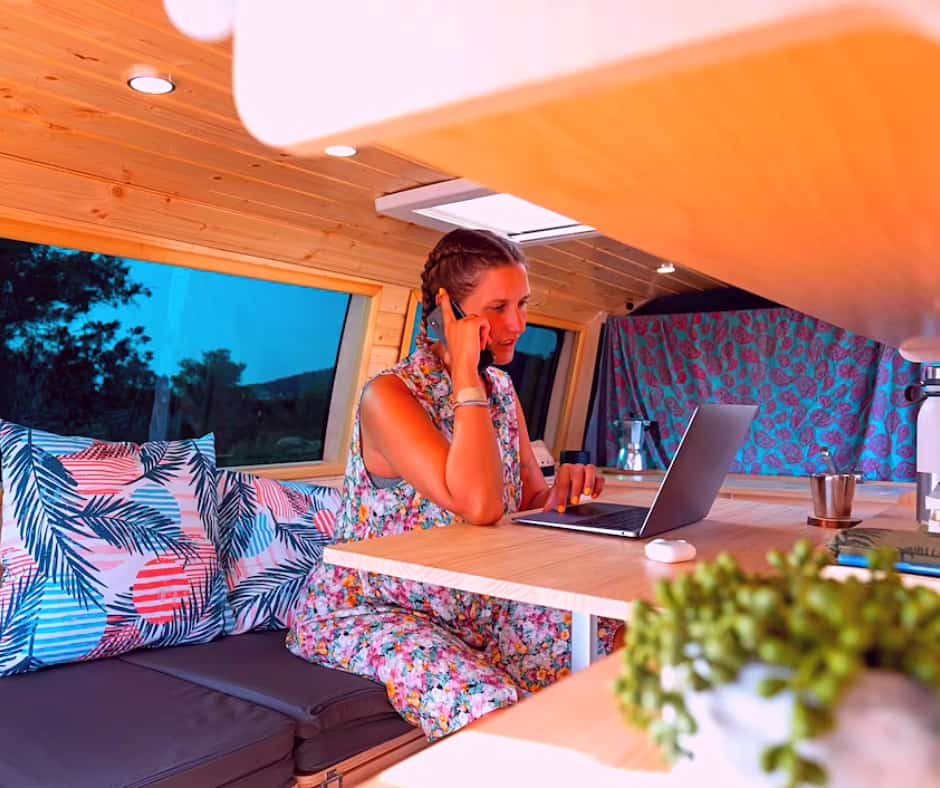
Here are some tips for embracing a minimalist lifestyle while setting up a workspace in your RV:
Get rid of unnecessary items:
Be ruthless in decluttering your workspace and getting rid of anything you don’t need or use regularly. This will help you maximize your limited space and create a more organized and productive workspace.
Opt for multi-functional items:
Choose furniture and equipment that serve multiple purposes, such as a desk that can be folded away, or a chair that doubles as storage.
Embrace simplicity:
Keep your workspace simple and streamlined, with only the essentials in sight. Use neutral colors and natural materials to create a calming and peaceful environment.
Practice mindful consumption:
Before making any purchases, consider whether the item is truly necessary and will add value to your life. Opt for high-quality, long-lasting items instead of disposable or cheap products.
By embracing a minimalist lifestyle and simplifying your workspace, you can reduce stress and increase productivity while enjoying the benefits of RV living.
The Challenges of Setting up a Workspace in an RV
One of the biggest challenges of setting up a workspace in an RV is dealing with limited space. However, with some creativity and careful planning, you can create a functional and efficient workspace that meets your needs.

Here are some tips for making the most of your limited space:
Optimize vertical space:
Use the walls and vertical space in your RV to maximize storage and workspace. Install shelves, cabinets, and hanging organizers to keep your workspace clutter-free.
Choose compact furniture:
Look for furniture that is specifically designed for small spaces, such as a folding desk or a wall-mounted table. Consider using a chair that can be stored under your desk when not in use.
Use multifunctional items:
Choose equipment that serves multiple purposes, such as a printer that also functions as a scanner and copier. Use storage bins that can double as seating or a table when needed.
Stay organized:
Keep your workspace tidy and organized to make the most of your limited space. Use drawer dividers, storage boxes, and labeling to ensure everything has a designated place.
Embrace minimalism:
Keep your workspace simple and uncluttered to avoid feeling cramped. Use a limited color palette and avoid unnecessary decorations or accessories.
By using these tips and strategies, you can create a workspace that is functional and efficient, even in a limited space like an RV. With some careful planning and a little creativity, you can make the most of your mobile office and enjoy the benefits of working on the go.
Location, Location, Location
When setting up a workspace in your RV, it’s important to find a suitable location that is comfortable, convenient, and conducive to productivity.
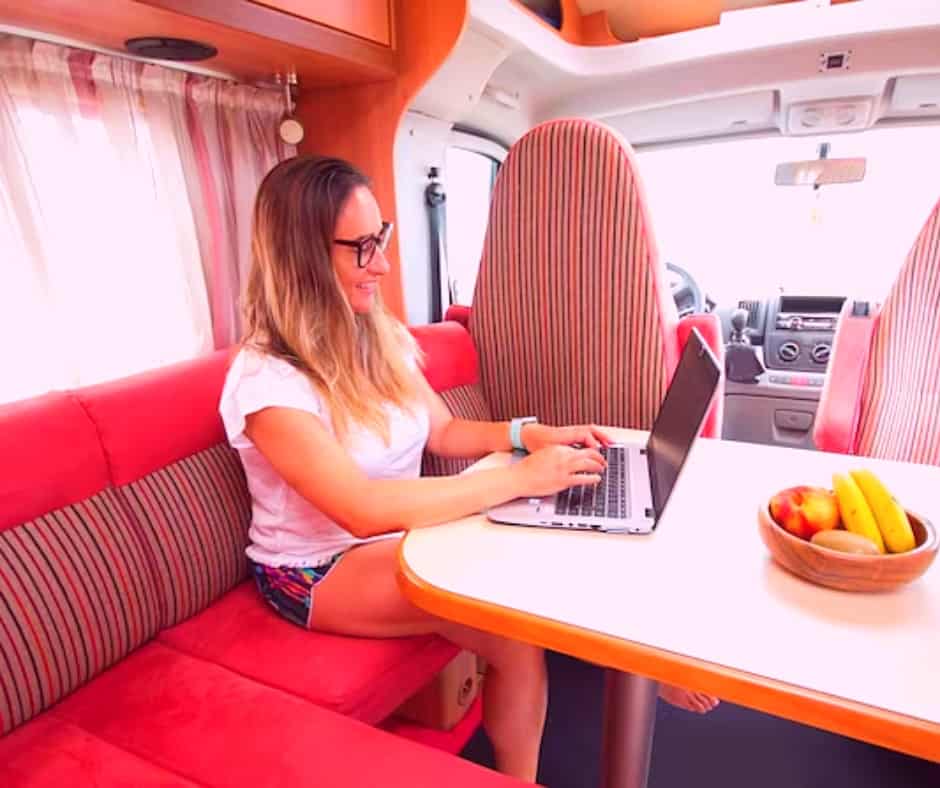
Here are some tips for finding the perfect spot:
Consider your needs:
Think about what type of work you’ll be doing and what kind of environment will be most conducive to your productivity. Do you need a quiet space? Will you be making phone calls or video conferencing? Will you need to access the internet or power outlets?
Look for natural light:
Choose a spot that is well-lit with natural light, which can help boost your mood and productivity. Look for a location near a window or skylight.
Choose a quiet location:
Avoid noisy areas like near the road or the generator, which can be distracting and disrupt your workflow. Look for a location that is peaceful and free from distractions.
Use a mobile hotspot:
If you need internet access, consider using a mobile hotspot instead of relying on public Wi-Fi, which can be slow and unreliable. A mobile hotspot will allow you to work from virtually anywhere with a strong cellular signal.
Stay organized:
Keep your workspace organized and free from clutter to create a more productive environment. Use a small table or desk to keep your work supplies organized and within reach.
By considering these tips and finding a suitable location for your mobile office, you can create a workspace that is comfortable, productive, and conducive to success.
Technology Solutions for RV Workspaces
Internet connectivity is essential for most RVers who work remotely or need to stay connected while traveling.

Here are some options for staying connected while on the road:
Campground Wi-Fi:
Many campgrounds and RV parks offer Wi-Fi access, but the quality and speed of the connection can vary greatly. Check with the campground ahead of time to see if Wi-Fi is available and what the speed and cost is.
Cellular data:
If you have a smartphone with a data plan, you can use your phone’s hotspot feature to create a Wi-Fi network for your devices. Keep in mind that data usage can be expensive and limited, depending on your plan.
Satellite internet:
Satellite internet can provide a reliable internet connection in remote areas where other options are not available. However, it can be expensive and the signal can be affected by weather conditions.
Wi-Fi extenders:
If you are using campground Wi-Fi, a Wi-Fi extender can help boost the signal and improve the quality of the connection.
Starlink
Aims to provide high-speed internet to even the most remote locations, making it an attractive option for those who frequently travel off the beaten path.
Starlink uses a network of low-orbit satellites to provide internet access, which can offer faster and more reliable connectivity than traditional satellite internet services. While the service is still relatively new, initial tests and reviews have been positive, with many users reporting speeds of 100 Mbps or more.
To use Starlink, you’ll need to purchase a starter kit that includes a satellite dish, Wi-Fi router, and power supply. Once set up, you’ll be able to connect to the internet using your computer or mobile device, just like you would with a traditional Wi-Fi network.
Starlink is still launching satellites to boost the network and a lot of geographical areas are on a wait list for the hardware. It has the potential to be a game-changer for those who rely on internet access while traveling. If you’re considering Starlink as a connectivity solution for your RV, be sure to check for coverage in your area and keep an eye out for updates and improvements as the service continues to grow.
We use this service and are extremely happy with the service. We have been in a few areas where there is no cell service and were connected at high speeds for the duration of our stay. You do have to have a clear view of the sky to get the top speeds but we have been able to get good service even in a treed environment. Antenna placement is key and if you can put up with a few seconds of interruptions, i.e. buffering/ obstructions, the service is hands above other options.
By exploring different internet connectivity options, you can stay connected and productive while enjoying the freedom and flexibility of RV living. Consider your specific needs and budget to choose the best option for you.
More Power!
Power sources and backup options are essential for RVers who work remotely or rely on electricity for their daily needs.
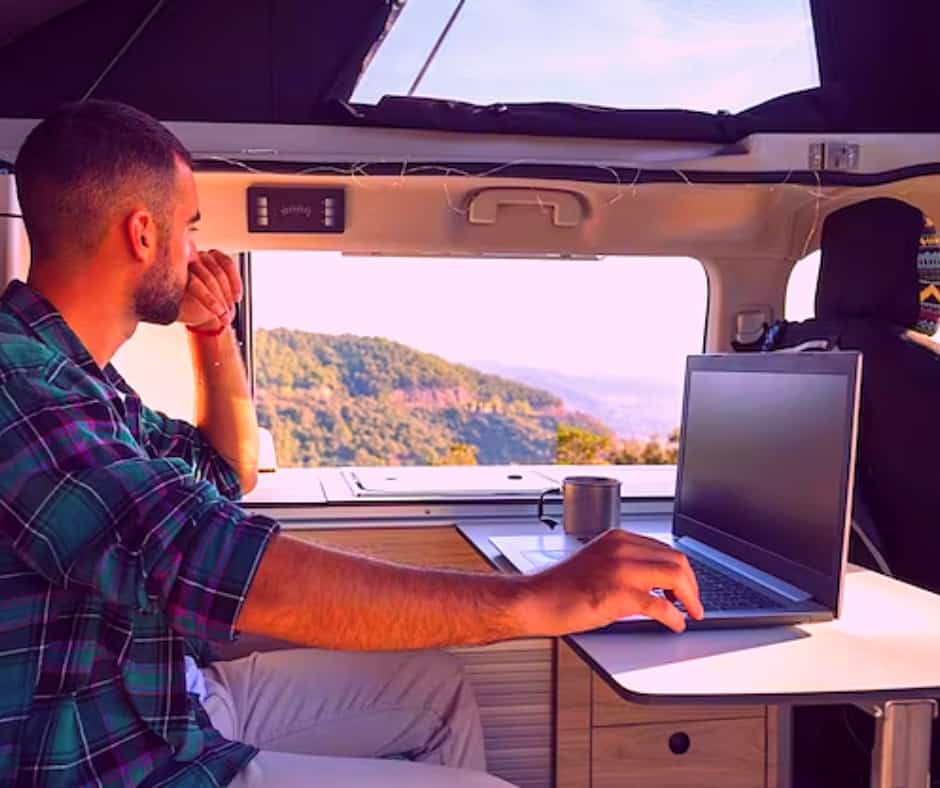
Here are some options for powering your RV and ensuring that you have a backup plan in case of power outages:
Generator:
A generator can provide power to your RV when you are off-grid or when there is a power outage. Generators can be powered by gas, propane, or diesel, and come in different sizes and power outputs.
Solar panels:
Solar panels can be mounted on the roof of your RV to provide a source of renewable energy. They can be used to charge your batteries and power your appliances, but they are not as reliable as other sources of power during cloudy or rainy weather.
Battery bank:
A battery bank is a collection of batteries that can be used to store energy and power your RV when you are off grid. Battery banks can be charged by solar panels, generators, or while driving, and can provide power for several days depending on the size and capacity of the bank.
Power inverter:
A power inverter can convert DC power from your batteries or generator into AC power for your appliances. This can be useful during power outages or when you are off grid.
By using a combination of power sources and backup options, you can ensure that you have a reliable source of electricity while on the road. Consider your specific power needs and budget to choose the best option for you. Additionally, it’s always a good idea to have backup plans and alternative power sources in case of emergencies or unexpected power outages.
Here are some recommended tech gadgets for RV workspaces:
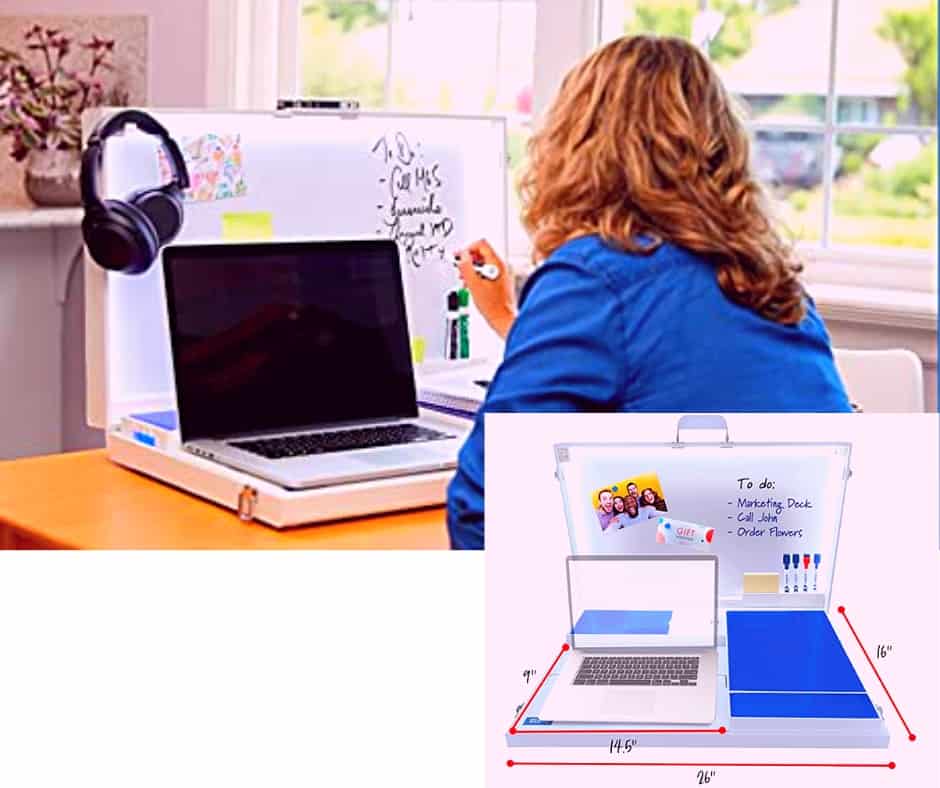
Laptop:
A lightweight laptop with a long battery life is a must-have for RV workspaces. Look for a model with a fast processor, plenty of storage, and a high-quality screen.
External monitor:
If you need more screen space, an external monitor can help you be more productive. Look for a model that is lightweight and portable, and that can be easily connected to your laptop.
Wireless keyboard and mouse:
A wireless keyboard and mouse can make it more comfortable to work for extended periods of time and can free up desk space. Look for models that are ergonomic and have a long battery life.
Portable scanner:
If you need to scan documents while on the road, a portable scanner can be a handy tool. Look for a model that is lightweight and compact, and that can scan both sides of a document at once.
Wi-Fi extender:
If you are using campground Wi-Fi, a Wi-Fi extender can help boost the signal and improve the quality of the connection. Look for a model that is easy to set up and use.
Portable printer:
If you need to print documents while on the road, a portable printer can be a useful tool. Look for a model that is lightweight and compact, and that can connect to your devices wirelessly.
By using these tech gadgets in your RV workspace, you can stay connected and productive while enjoying the freedom and flexibility of RV living. Consider your specific needs and budget to choose the best options for you.
Conclusion
Setting up an RV office space can be challenging, but with a little creativity and the right equipment, it’s possible to create a comfortable and functional workspace. Whether you’re a full-time traveler or a weekend warrior, having a designated workspace can help you stay productive and connected on the road.
From choosing the right furniture and equipment to maximizing storage and enhancing productivity with natural light and fresh air, there are many ways to create an RV workspace that works for you.
By considering these tips and resources, you can enjoy the best of both worlds: the freedom and adventure of RV living, combined with the convenience and comfort of a functional workspace. So go ahead, hit the open road, and get to work!
Related Blogs

Easy RV Workouts
Easy RV Workouts Are you a proud owner of an RV? Whether you’re a full-time RVer or just enjoy the occasional road trip, it’s important

RV Office Space
RV Office Space Tips Setting up an RV office space may be just what you need to make that dream of Full Time RV living

Best Hikes For Every Level
Best Hikes For Every Level Best Hikes For Every Level Are you a camper or full-time RVer looking for a way to stay active, we’ll
